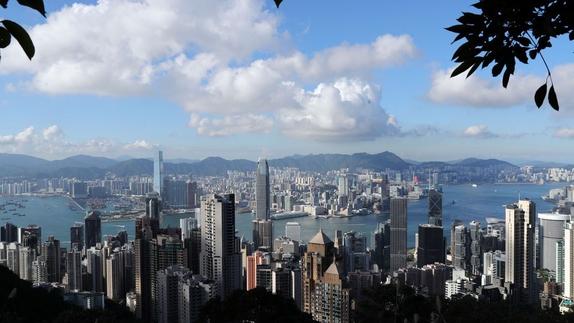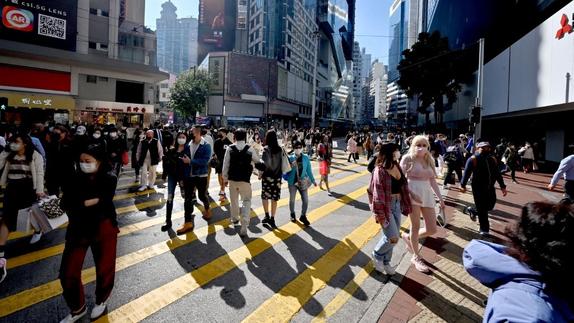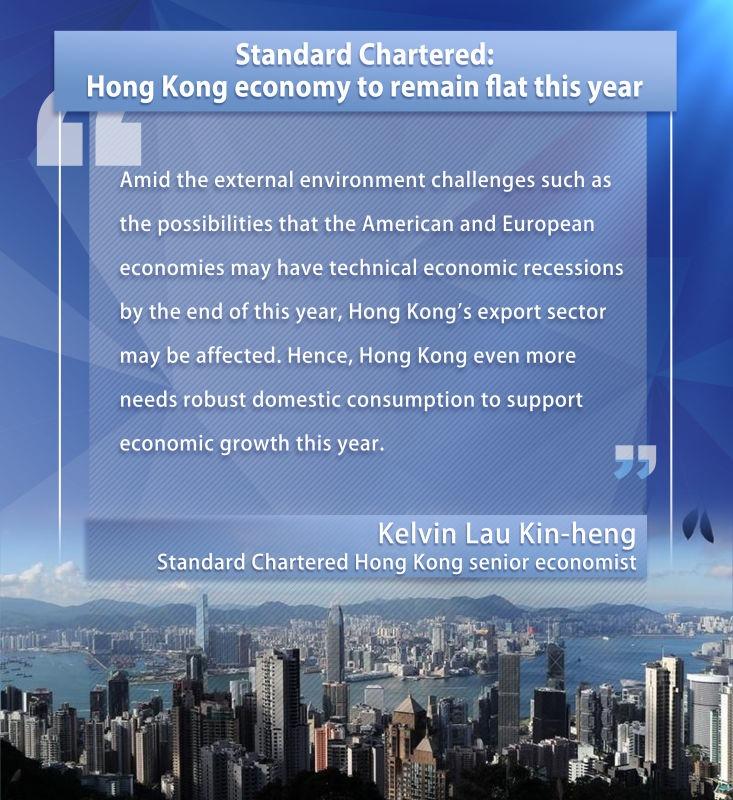 This photo shows a view of Victoria Harbour in Hong Kong on June 11, 2020. (LI GANG / XINHUA)
This photo shows a view of Victoria Harbour in Hong Kong on June 11, 2020. (LI GANG / XINHUA)
The Hong Kong economy will remain almost flat this year but may expand at an accelerated rate of 4.5 percent next year, Standard Chartered Hong Kong said on Friday.
Speaking at a Friday news conference, Kelvin Lau Kin-heng, Standard Chartered Hong Kong senior economist, said the city’s economic data in the second quarter have drastically improved. Assuming that there will not be a sixth wave of the COVID-19 pandemic, the city’s unemployment can be expected to decrease to the previous 3.9 percent level, he said.
Amid the external environment challenges such as the possibilities that the American and European economies may have technical economic recessions by the end of this year, Hong Kong’s export sector may be affected. Hence, Hong Kong even more needs robust domestic consumption to support economic growth this year.
Kelvin Lau Kin-heng, Standard Chartered Hong Kong senior economist
“Amid the external environment challenges such as the possibilities that the American and European economies may have technical economic recessions by the end of this year, Hong Kong’s export sector may be affected. Hence, Hong Kong even more needs robust domestic consumption to support economic growth this year,” Lau cautioned.
Lau said he expects the Hong Kong economy to grow a merger 0.2 percent in 2022 when an economic rebound in the second half of this year will recoup the majority of losses in the first half.
In 2023, the city’s economy will register 4.5 percent growth due to the lower base of comparison last year, and the expected further relaxation of social distancing measures that can boost cross-border travel, the economist added.
ALSO READ: HKU: Hong Kong's economy to grow for two successive quarters
The Hong Kong economy contracted 4 percent year-on-year in the first quarter this year because of slower growth in global demand, and because pandemic-induced cross-boundary transportation disruptions posed significant drags to exports. The fifth wave of the pandemic and resultant restrictive measures also weighed heavily on a wide range of economic activities as well as economic sentiment.
Regarding the interest rate trend, Lau anticipates the United States Federal Reserve will raise interest rate by a combined 125 basis points at its July and September meetings. Hence, he expects the Hong Kong Interbank Offered Rate (HIBOR) will shoot up sharply in the short term.
“When interest rate hikes become more stable, the HIBOR will reach to the zenith level in the fourth quarter this year, and therefore the pressure for the Hong Kong dollar to depreciate further may lessen,” Lau said.
ALSO READ: Chan: HK's economy in best position to grow
 Pedestrians cross a busy intersection in Causeway Bay in Hong Kong on Jan 4, 2022. (PETER PARKS / AFP)
Pedestrians cross a busy intersection in Causeway Bay in Hong Kong on Jan 4, 2022. (PETER PARKS / AFP)
In 2023, the city’s economy will register 4.5 percent growth due to the lower base of comparison last year, and the expected further relaxation of social distancing measures that can boost cross-border travel, the economist added
“When the aggregate balance of the Hong Kong banking system drops to the level below HK$100 billion ($12.74 billion), the HIBOR will rise sharply to narrow the US dollar-HK dollar widening spreads due to interest rate hikes in the United States. Therefore, market equilibrium can be restored, and it is very unlikely that the aggregate balance will exhibit endless declines,” Lau said.
Since the US Fed kicked off interest rate hikes this year to contain soaring inflation, the widening HK dollar-US dollar yield spreads keep the spot Hong Kong dollar exchange rate on the weak-side convertibility guarantee level of 7.85, forcing the HKMA to passively buy Hong Kong dollars from the market.
As of Thursday, the aggregate balance — the key gauge of cash in the city’s banking system — had fallen to HK$176.6 billion following the currency intervention.
READ MORE: HKMA buys HK$8.07b from market to defend currency peg
Currency intervention also leads to a rise of the mortgage-linked one-month HIBOR, soaring for a seventh day to 1.01 percent as of Friday, the highest since June 2020.
As part of the automatic adjustment process under the linked exchange-rate system, when the widening HK dollar-US dollar yield spread (due to US interest rate hikes) triggers the Hong Kong dollar to reach the weak-side convertibility level, the Hong Kong Monetary Authority will sell US dollars and buy Hong Kong dollars, drawing down excess interbank Hong Kong dollar liquidity.



